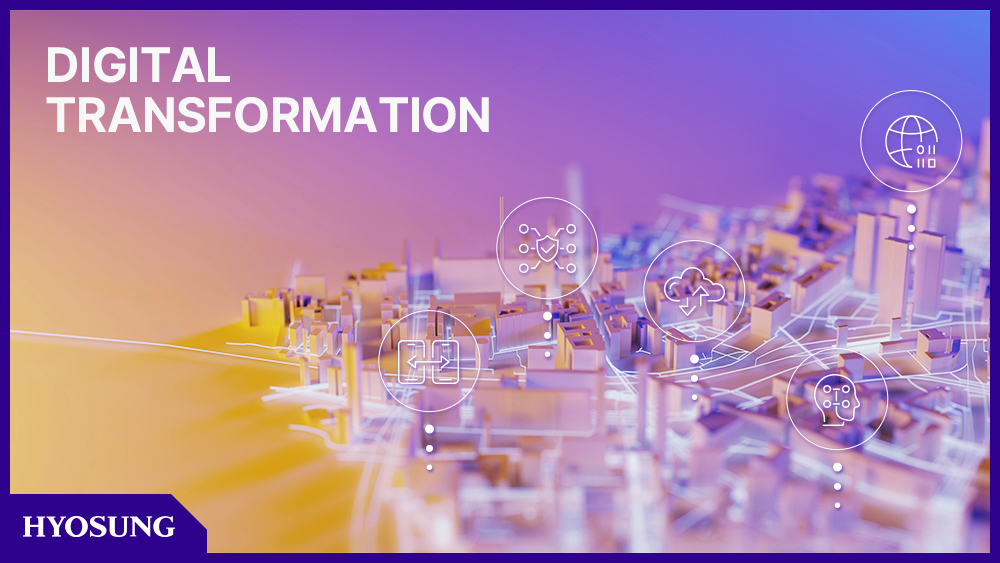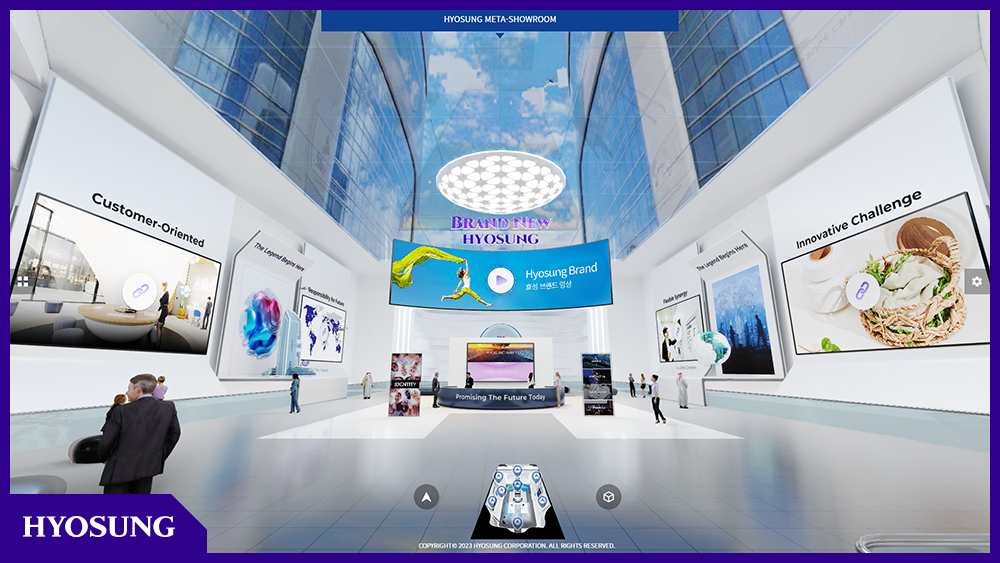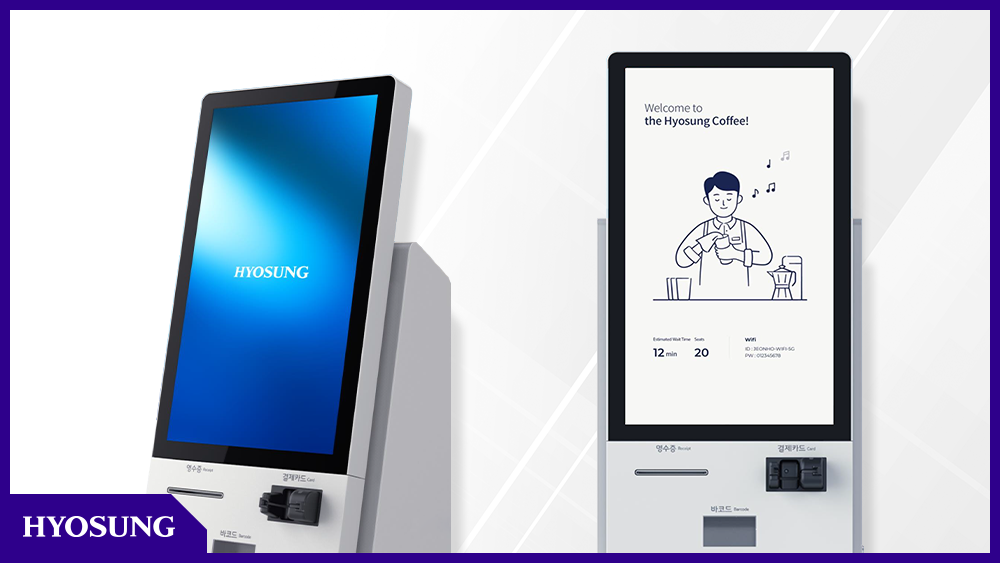Digital Transformation of Hyosung
2023.05.31
Smart cities are no longer the settings of science fiction or a matter of the far future. With the widespread use of smartphones and AI technologies, advanced technologies have emerged, enabling us to ride in self-driving cars, replace identification with QR code recognition, and manage crops and home gardens through smart farming. We can already use augmented reality (AR) to see how clothes look on us without physically wearing them and pre-order cars to be delivered with the full options requested. It is common to have AI technology embedded in our smartphones collecting our data on how we commute and what our interests and consumption patterns are. Advancements in AI technology, along with the widespread use of smartphones, have accelerated the development of information and communication technology (ICT), which is changing our lives in remarkable ways.
Technology-driven Acceleration of Digital Transformation
The COVID-19 pandemic has fueled this trend, with recent advancements in AI bringing us closer to the era of technological singularity, where machines may surpass human intelligence. The pandemic has also disrupted traditional business models, emphasizing the need for platform-based super-convergence and super-connectivity. As such, companies across all industries are prioritizing digital transformation (DX) to stay competitive and create new business opportunities. In this era, successful incorporation of digital transformation (DX) is critical for business success, and manufacturers are particularly challenged to effectively utilize data to restructure their business models, improve competitiveness, and develop new growth opportunities. Hyosung recognizes the importance of leveraging concrete data on customer feedback and market situations to remain competitive and achieve growth.

Smart factory - How Hyosung Capitalizes on DX
Hyosung is committed to leveraging digital transformation (DX) to enhance its manufacturing competitiveness and build smart factories across its global locations. In this regard, the company has been incorporating the latest technological developments to upgrade its manufacturing operations in South Korea, China, Vietnam, and India. One of the most significant initiatives in this area is the implementation of 'XTRM FACTORY’ system since 2018, which is a big data analysis and monitoring system designed for factory applications. The 'XTRM FACTORY’ system automatically collects and stores quality data generated during the manufacturing process. This data is analyzed by factory managers who can analyze past problems and accidents as well as any deviations from normal operations. Based on this analysis, optimal operation requirements are determined, and corrective actions are taken to improve the safety of factory operations. Additionally, the XTRM FACTORY has another key advantage of enabling factory managers to immediately identify issues and implement countermeasures immediately in the event of a sudden accident or problem.
Global Smart Factories Built by Hyosung
Hyosung implements various types of smart factory technologies in its domestic factories. At the Changwon plant, Hyosung Heavy Industries has designed a smart factory system based on a manufacturing execution system (MES) and IoT (Internet of Things). At the heart of this smart factory system is a wireless network (WIFI 10G) that covers approximately 220,000 square meters of the entire plant complex, consisting of manufacturing facility units 1 to 4. This wireless network connects around 980 IoT devices ranging from kiosks to smart pads, scanners, and PDAs. Through the smart factory system, factory managers can check work progress at each manufacturing process and monitor changes in the plan on the spot. Data collected and analyzed on the spot are then used for the overall management of factory processes such as quality management, process management, equipment management, etc., resulting in increased productivity. Hyosung Chemical has built a smart factory equipped with a process monitoring system (PMS), quality management system (QMS), and visual analysis system (VAS). This system connects all resources related to manufacturing, enabling business decisions to be made based on collected data. To utilize the smart factory more actively, Hyosung Chemical has delegated the role of managing the smart factory system to competent workers in-charge.
Hyosung has implemented smart factory technologies not only at its domestic factories but also some of its overseas manufacturing plants. For example, Hyosung Advanced Materials launched a big data analysis project in 2017 to increase efficiencies in its textile and steel wire manufacturing processes and to establish quality management at its Vietnam subsidiary. The project culminated in the construction of a big data system at its Vietnam facility. In 2020, Hyosung Advanced Materials formed a company-wide smart factory task force that identified three key tasks necessary for implementing data-based management: digital transformation of all manufacturing plants, big data analysis, and the application of AI and process automation. The task force cooperates with other departments by sharing the progress status of the project. Hyosung TNC is another subsidiary that has upgraded its spandex factory in China and Vietnam to smart factories. These factories now operate in a next-generation production environment that allows for real-time monitoring, quality level management, and consistent quality levels. Smart factories provide another advantage of collecting data during the entire manufacturing process (from raw material importing to production and shipping), which can be analyzed and controlled for managing manufacturing more effectively.

Customer Interface in the Virtual World Through Hyosung Group’s Digital Showroom
To better communicate with customer while leveraging technology, Hyosung has decided to create a virtual showroom on digital platform to showcase its products and services. Hyosung Group’s digital showroom is designed to be an interactive platform that allows the company to communicate and engage with customers in exciting and innovative ways. Customers from all over the world can visit Hyosung Group’s showroom without the physical constraints of time and space. The digital showroom is testament to Hyosung’s commitment to delivering its brand story through the virtual world. By visiting the digital showroom, customers can learn more about Hyosung’s key businesses, including heavy industries, advanced materials, chemicals, and Hyosung TNS, as well as its ESG management and vision for a sustainable lifestyle. The virtual world offers an opportunity for the company to update different forms of content and provide new and exciting experiences that are not possible in the physical world. The Hyosung Group digital showroom is a convenient and accessible platform that enables anyone to explore the company's products and services from anywhere in the world. The company hopes that the digital showroom will provide customers with a unique and memorable experience and is excited to see how the image of Hyosung unfolds in the virtual world.

Retail Solution, a New Vision of Retail Developed by Hyosung TNS
Around us, there is already a very familiar future technology. Since the beginning of the pandemic, face-to-face services have been gradually declining, and people are more comfortable than ever using kiosks with self-check-in and check-out functions. Due to the growing number of unmanned cafes and stores where vending machines or AI robots take orders, serve, and even prepare beverages, many stores are now equipped with kiosks capable of handling orders and payments from customers. Similar to the kiosks that were unfamiliar to most before the pandemic, but are now well-known to everyone, the retail solutions from Hyosung TNS have become an integral part of our daily lives. In a store equipped with Hyosung TNS’s retail solution, customers can self-check in and check out, order and pay for goods using AI, and have an AI robot prepare their drink. Also, with a single mobile app, customers can remotely control all data related to ordering and paying on the kiosk. The retail solution from Hyosung TNS eliminates the need for manual inventory checks. The solution enables the store manager to check what products are being purchased by customers, and the system takes care of both inventory and sales management. Even an AI robot makes drinks for the customers. The store owner simply monitors the store using the mobile app on a smartphone, check data, and confirm the sale with one click. Hyosung’s retail solutions that we have been using are considered the retail of the future.
At the advent of the coming era of singularity, accelerated by advancements in AI, it is imperative for companies to equip a system that combines data with IT that enables quick response to customer requirements. Today, the success of a company is heavily reliant on its ability to undergo successful digital transformation, and all companies will face the crossroads of either reaping digital rewards or losing out, given the inevitable and critical role of digital transformation. In order to become a leader in technology, rather than simply following it, a company must proactively manage its businesses more efficiently by utilizing evolving technologies. To provide customers with better products, services, and innovative lifestyles, the company is preparing itself for the era of singularity. Going forward, Hyosung will pursue company-wide efforts to lead the transformation era by responding with greater flexibly and adopting the latest technological advancements.